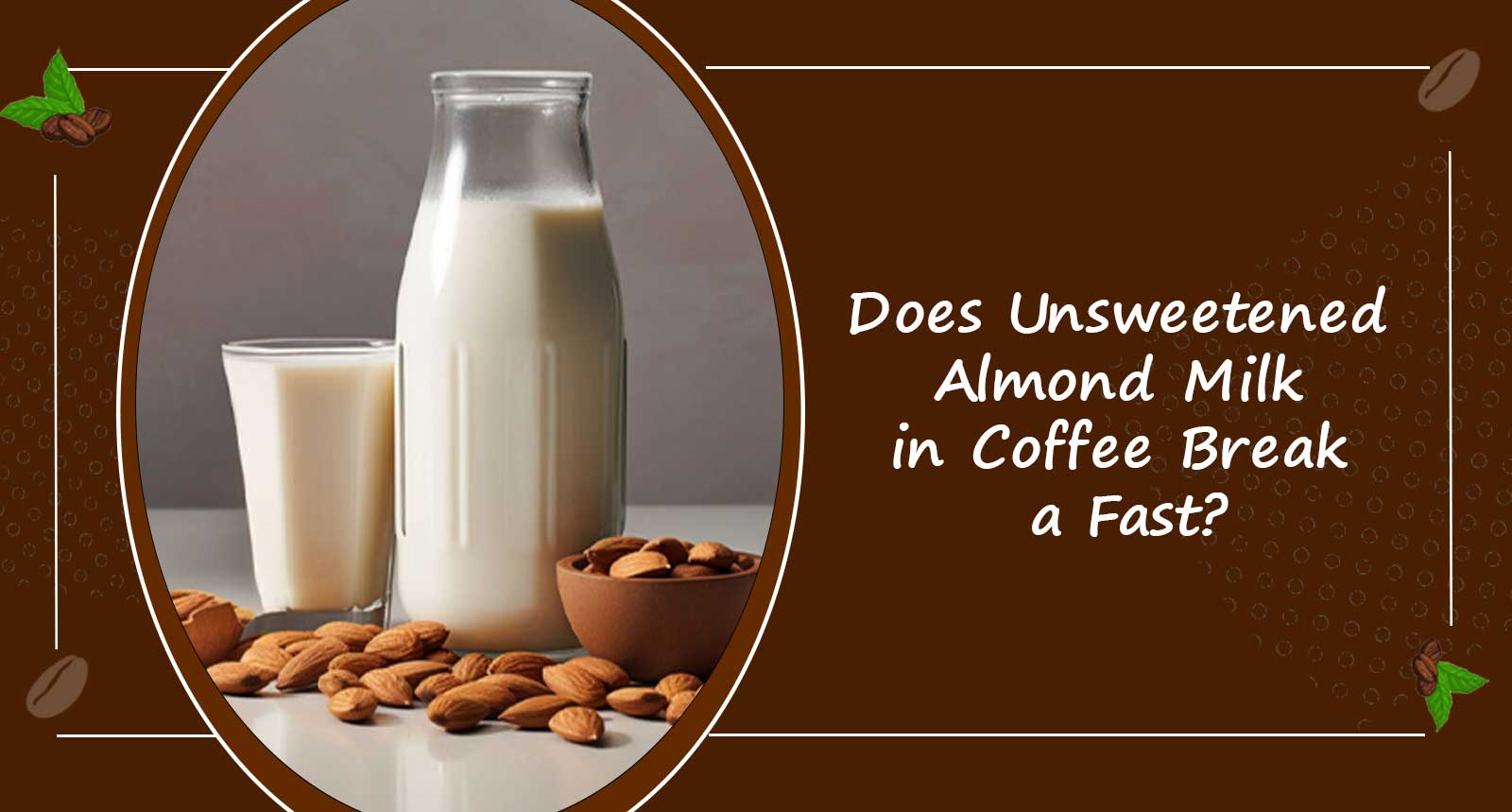Join us on a journey to demystify the age-old query: Does unsweetened almond milk in coffee break a fast? We’ll delve into the nitty-gritty details, separating fact from fiction and helping you make informed choices on your fasting journey.
If you’ve ever found yourself pondering whether that dash of unsweetened almond milk in your morning brew is a fasting faux pas, you’re not alone. In the world of intermittent fasting, where every calorie and component counts, it’s vital to be discerning about what goes into your cup.
Does Almond Milk Break a Fast?
It’s time to get to the bottom of things. Is almond milk interfering with your fasting? To answer this, we need to consider a few key factors:
Caloric Content
Unsweetened almond milk is renowned for its minimal calorie count. In fact, a standard serving typically contains around 13-17 calories, depending on the brand. Compare this to the calorie-laden options like whole milk or cream, and it’s evident that almond milk is a much lighter choice.
Insulin Response
One of the primary concerns during fasting is the potential for foods or drinks to spike insulin levels. Fortunately, unsweetened almond milk is a low-glycemic beverage with a negligible effect on insulin. It won’t disrupt the metabolic state of fasting, making it a favored choice among many intermittent fasters.
Nutrient Density
Almond milk doesn’t contain the protein or fat found in whole milk, it’s often fortified with vitamins and minerals, such as calcium and vitamin D. These additions can provide some nutritional benefits during your fasting window without compromising your fast.
Unsweetened almond milk is a promising companion to your fasting routine. Its minimal calorie count and low impact on insulin levels make it a preferred choice for those striving to maintain their fasting state.
Does Unsweetened Almond Milk in Coffee Break a Fast?
Coffee lovers, rejoice! We’re about to tackle a common conundrum in the fasting community: the compatibility of unsweetened almond milk with your beloved morning brew. The verdict? It’s a promising combination for most fasting enthusiasts, but let’s break it down further:
Minimal Caloric Impact
Unsweetened almond milk brings a negligible number of calories to your coffee cup. A typical serving adds only about 13-17 calories, which is unlikely to kick you out of a fasting state. This makes it a smart choice for those aiming to enjoy coffee without breaking their fast.
Minimal Insulin Response
During fasting, it’s crucial to avoid foods or additives that can trigger an insulin spike. The good news is that unsweetened almond milk has a low glycemic index and shouldn’t significantly affect insulin levels. It allows you to savor the creaminess of your coffee while keeping your fast intact.
Enhanced Coffee Experience
Unsweetened almond milk can lend a delightful creaminess to your coffee, often without the need for sugar or artificial sweeteners.
This can make your fasting experience more enjoyable, as you savor the flavor and texture of your morning ritual without compromising your goals.
If you’re a dedicated fasting purist or have specific concerns, you may choose to abstain from any additives during your fasting window. But for most, a splash of almond milk won’t disrupt your fast and can enhance your coffee experience.
Can You Have Almond Milk While Fasting?
The flexibility of intermittent fasting allows for a range of choices when it comes to what you consume during your fasting window.
Almond milk is often a preferred option for those seeking a light, nutritious addition. Let’s explore the scenarios in which you can incorporate almond milk while fasting:
Intermittent Fasting
For most forms of intermittent fasting, such as the 16/8 method or the 5:2 approach, including unsweetened almond milk should not pose a problem.
Its minimal calorie content and low glycemic index make it a suitable choice to accompany your fasting routine. It can add flavor and creaminess to your beverages without jeopardizing your fasting goals.
Time-Restricted Eating
Time-restricted eating (TRE) restricts your eating window to a specific period each day. Unsweetened almond milk can be a helpful addition during your eating window, providing a source of essential nutrients like calcium and vitamin D while complementing your dietary choices. Just ensure it aligns with your overall calorie and nutritional goals.
Extended Fasting
During extended fasts of 24 hours or more, the rules can become more stringent. While water, tea, and black coffee are typically allowed, some practitioners prefer to avoid almond milk and similar additives to maintain a strict fast. However, individual tolerance varies, so you can experiment to see how your body responds.
Many find it to be a valuable addition that enhances the fasting experience without undermining the benefits of fasting itself. As always, it’s advisable to consult with a healthcare professional or nutritionist for personalized guidance on your fasting journey.
Benefits of Unsweetened Almond Milk
Unsweetened almond milk isn’t just a fasting-friendly choice; it also offers a host of health benefits that can make it a valuable addition to your daily routine. Here are some of the advantages of incorporating this dairy-free alternative into your diet:
Low in Calories
Unsweetened almond milk is a calorie-conscious option, making it ideal for those aiming to manage their weight. It contains significantly fewer calories than cow’s milk, making it a smart choice for those seeking a lighter beverage.
Dairy-Free
Almond milk is an excellent dairy-free alternative for individuals with lactose intolerance or dairy allergies. It provides a creamy texture without the digestive discomfort associated with dairy products.
Nutrient Fortification
Many brands of almond milk are fortified with essential nutrients like calcium, vitamin D, and vitamin E. This fortification can contribute to your daily nutrient intake, especially if you have dietary restrictions.
Heart-Healthy
Unsweetened almond milk is naturally low in saturated fats and cholesterol, which can benefit heart health. Additionally, almonds are known for their heart-healthy monounsaturated fats, which may have a positive impact on cholesterol levels.
Vegan-Friendly
For individuals following a vegan or plant-based diet, almond milk serves as an excellent milk substitute. It can be used in cooking, baking, and as a creamy addition to beverages, offering versatility in the kitchen.
Bone Health
Fortified almond milk is a source of calcium, which is crucial for maintaining strong bones and teeth. It can be a valuable addition to your diet if you’re concerned about calcium intake, particularly if you avoid dairy products.
These benefits make unsweetened almond milk a popular choice among health-conscious individuals, whether they’re fasting or not. It’s a versatile, nutritious option that can complement various dietary preferences and support your overall well-being.
How Many Calories Does Unsweetened Almond Milk Add to Coffee?
Unsweetened almond milk is a popular choice for its creamy consistency and low-calorie profile. So, just how many calories does it add when you mix it with your coffee?
An average serving of unsweetened almond milk, which is around 1 cup (240 ml), contains approximately 13-17 calories. This calorie content is significantly lower than that of whole milk, cream, or sweetened coffee creamers, which can pack a hefty caloric punch.
It’s worth noting that the calorie count of your coffee will also depend on any additional ingredients you use, such as sweeteners or flavorings.
Does Almond Milk Break a Keto Fast?
For those following a ketogenic (keto) diet, fasting can be a complementary strategy to enhance fat burning and ketone production. But does almond milk, a popular keto-friendly beverage, disrupt your keto fast? Let’s explore this in detail:
Carbohydrate Content
Ketosis, a hallmark of the keto diet, relies on keeping carbohydrate intake extremely low. Unsweetened almond milk typically contains fewer carbohydrates compared to cow’s milk, making it a keto-friendly choice. However, it’s essential to check the label for added sugars or fillers, as these can affect your carb count.
Protein and Fat
Almond milk is naturally low in protein and fat, which aligns with the macronutrient ratios favored by keto practitioners. It won’t significantly disrupt your fat intake, making it a compatible addition during your fasting window.
Insulin Response
Ketosis thrives on low insulin levels, and almond milk generally has a minimal impact on insulin due to its low glycemic index. This means it’s unlikely to disrupt your fasting-induced ketosis.
Unsweetened almond milk can be a keto-friendly addition during your fasting window. It provides a creamy texture and a mild, nutty flavor without significantly affecting your carb, fat, or protein intake. However, remember that strict adherence to your dietary and fasting goals is key to achieving success with keto.
Nutrition Facts of Unsweetened Almond Milk
Understanding the nutritional profile of unsweetened almond milk is essential for making informed dietary choices. Whether you’re fasting, following a specific diet, or simply seeking a nutritious beverage, here’s what you need to know about the nutrition facts of this dairy alternative:
Calories
An 8-ounce (240 ml) serving of unsweetened almond milk typically contains around 13-17 calories. This makes it an excellent low-calorie option, ideal for those looking to manage their calorie intake.
Carbohydrates
Unsweetened almond milk is notably low in carbohydrates, with approximately 1-2 grams per serving. This minimal carb content makes it suitable for various dietary plans, including low-carb and keto diets.
Protein
Almond milk is not a significant source of protein, providing only about 1 gram per serving. If you’re looking to increase your protein intake, consider complementary protein sources in your diet.
Fat
Unsweetened almond milk is low in fat, typically containing 1-2 grams of total fat per serving. The fat content is primarily monounsaturated fats, which are considered heart-healthy.
Vitamins and Minerals
Many brands of almond milk are fortified with essential nutrients, including calcium, vitamin D, and vitamin E. These fortifications can contribute to your daily nutrient intake, particularly if you have dietary restrictions or specific nutritional goals.
Sugar
Unsweetened almond milk is virtually free of added sugars. It gets its slight sweetness from the natural flavor of almonds. Always check the label to ensure that no sugar or sweeteners have been added.
These nutrition facts highlight the light and health-conscious nature of unsweetened almond milk. Whether you’re fasting, aiming to reduce your calorie intake, or accommodating dietary restrictions, it’s a versatile beverage that can align with a variety of nutritional goals.
Frequently Asked Questions
Can I have unsweetened almond milk in my coffee during intermittent fasting?
Yes, unsweetened almond milk is generally considered fasting-friendly. It has minimal calories and a low glycemic index, which means it’s unlikely to disrupt your fasting state. However, individual responses may vary, so it’s essential to monitor how your body reacts.
How much almond milk can I add to my coffee while fasting?
There’s no strict rule for the amount of almond milk you can add to your coffee while fasting. Most people find that a splash or a few tablespoons of unsweetened almond milk is sufficient to enhance the taste and creaminess without significantly impacting their fast.
Can I sweeten my coffee with almond milk during fasting?
You can sweeten your coffee with unsweetened almond milk if you prefer a touch of sweetness. However, be cautious about adding sugar or sweeteners, as they may break your fast by spiking insulin levels. Option for unsweetened almond milk to keep your fast intact.
Are there any flavored almond milk options for coffee during fasting?
Some brands offer flavored almond milk options like vanilla or chocolate. While these can be delicious, be sure to check the labels for added sugars and calorie content. Unsweetened versions are the safest choice for fasting.
Does almond milk in coffee affect autophagy during fasting?
Autophagy, the cellular cleaning process, is a sought-after benefit of fasting. Some studies suggest that adding a small amount of unsweetened almond milk to your coffee is unlikely to significantly affect autophagy. However, for a strict autophagy-focused fast, it’s best to stick to plain water or black coffee.

